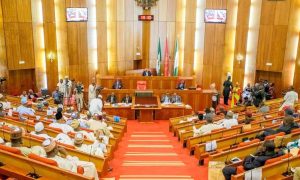Headline inflation eased for the first time since December 2022, primarily supported by the high statistical base from last year’s corresponding period. Precisely, the National Bureau of Statistics (NBS) reported that Nigeria’s headline inflation eased by 80bps to 33.40% y/y in July 2024 (June: 34.19% y/y). Notably, food prices (-134bps to 39.53% y/y) moderated after eighteen consecutive months of increase, while the core inflation (+6bps to 24.47% y/y) rose marginally. The reading is 13ps and 10bps higher than Cordros’ (33.27% y/y) and Bloomberg’s median consensus (33.30% y/y) estimates, respectively. Similarly, on a month-on-month basis, headline inflation slowed by 3bps to 2.28% (June: 2.31% m/m), mainly due to a moderation in food prices.
Food inflation moderated by 8bps to 2.47% m/m in July (June: 2.55% m/m) primarily due to the commencement of the green harvest and the moderation in food demand previously boosted by the Id el Kabir Celebrations in June. That said, prices slowed across the Farm produce (-14bps to 2.47% m/m), Imported food (-41bps to 2.51% m/m) and Processed food (-6bps to 2.47% m/m) sub-baskets. At the same time, on a year-on-year basis, food inflation decelerated by 134bps to 39.53% (June: 40.87% y/y), mainly due to the base effect. Nonetheless, we note that food prices remain elevated as food supplies remain constrained by (1) the lean season – typically between June and mid-September, (2) heightened levels of conflict in food-producing regions, and (3) flood incidence in some regions of the country. On the latter, the Famine Early Warning Systems Network (FEWSNET) revealed increasing levels of flood across the country, with about 21 LGAs in 10 states reporting significant flooding as of the end of July. Additionally, high logistics costs and the feedthrough impact of the depreciation of the naira on imported food items have kept food prices high.
Meanwhile, core inflation rose by 10bps to 2.16% m/m (June: 2.06% m/m), pushing the year-on-year rate to 27.47% y/y (June: 27.40% y/y). We attribute the upward price pressure primarily to the increased volatility in the naira. Specifically, the naira depreciated by 4.5% m/m on average to NGN1,558.12/USD at the Nigerian Autonomous Foreign Exchange Market (NAFEM) in July (June average: NGN1,487.60/USD). Notably, increased price pressures were recorded across Alcoholic beverages and Tobacco (+68bps to 2.61% m/m), Health (+45bps to 1.87% m/m), Clothing and Footwear (+43bps to 1.81%), Furnishings & Household Equipment Maintenance (+36bps to 1.82% m/m), Miscellaneous Goods and Services (+27bps to 2.07%) and Transport (+7bps to 2.47% m/m) sub-baskets. Conversely, prices slowed across the Utilities (-27bps to 1.89% m/m), Education (-35bps to 1.17% m/m) and Restaurants & Hotels (-17bps to 2.48% m/m) sub-baskets.
Headline Inflation to Moderate Further in August
In formulating our outlook for inflation for August, we consider two key factors and their potential impact on consumer prices. These include (1) the recent Retail Dutch Auction in the Foreign exchange market to reduce FX demand pressure and stabilise the naira and (2) increased PMS prices due to insufficient supply. On (1), the Central Bank of Nigeria (CBN) conducted a Retail Dutch Auction on 7 August, where USD815.36 million was auctioned to retail-end users, predominantly manufacturers, out of a total bid value of USD1.19 billion. The cut-off rate was set at NGN1,459.00/USD, below the NAFEM rate of NGN1,596.20/USD as of the same period. Therefore, we expect this to mitigate the exchange rate pass-through effect on consumer prices in August, particularly for imported food and non-food items.
Specifically, for food inflation, we anticipate further moderation in food prices, primarily due to the ongoing green harvest and reduced exchange rate pass-through on imported food items. While we acknowledge the FG’s approval of some measures in moderating food prices, including the distribution of agro-inputs to farmers and suspension of import duty on essential food items, we do not expect a significant decline in food prices in August. This is because of an anticipated delay in the execution of the initiative by Nigerian Customs despite the approval in July. Consequently, we project food inflation to rise by 2.38% m/m in August, down from 2.47% m/m in July, resulting in a year-on-year rate of 37.54% (July: 39.53% year-on-year).
While the CBN’s FX retail auction is expected to positively affect the prices of imported non-food items, we believe that higher transportation costs driven by the increase in PMS prices due to the tight supply in late July and early August could offset gains. As a result, we expect core inflation (excluding farm produce) to increase by 2.05% m/m (July: 1.99% m/m), pushing the year-on-year rate to 26.09% (July: 26.28% y/y). Accordingly, we forecast headline inflation to moderate marginally by 2bps to 2.26% m/m (July: 2.28% m/m) in August, translating to a 118bps slowdown in the y/y inflation rate to 32.21% (July: 33.40% y/y).



























